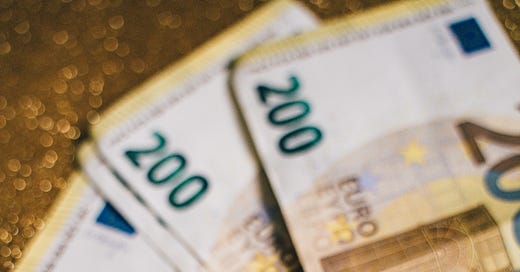digital money vs. cash
Fallacy discovered? Or simply discovered a manipulative argument?
The main argument for the ban on cash is the suppression of blackmoney.
At first glance, this seems plausible.
But what is blackmoney? Money that comes from a criminal business. The main argument for the ban on cash is that there are some who make money from criminal activities. This forces the government to ban cash
I dare to take a different look: in order to fight criminal markets, one must first and foremost fight criminal markets.
How do I think this should go?
In the first step, it is important to have exact figures. Numbers that show which activities are mainly involved (drugs, weapons, etc.), and numbers that show the value generated from them. That is of course difficult in view of the matter. However, there are estimates, which most people refer to when it is argued that black money accounts for too high a proportion. In this step, it must be determined whether this is actually too high a number or whether it is manageable.
As a second step, society should ask itself: do we still want those things to be illegal. In any case, this has to be done differently. Many will say “Legalize it” when it comes to cannabis, but not when it comes to child trafficking, trafficking in women or the legalization of heroin. Many laws have existed for a long time. For example, cannabis has been banned in Germany since 1929. At that time many things might speak for it and less against it. Or maybe there were other reasons for the ban. In any case, the core idea behind this step is: How much speaks for a ban? Or to put it another way: If everything were allowed, would we now again agree that those activities should be forbidden? Because by definition, that black money is only black money because it was generated through prohibited activities. By definition, it would not be black money if that activity were allowed. In no way does the author aim for morally reprehensible activities and actually harmful actions to be legalized just so that there is no black money problem in the end. However, it should be clear that some laws do not reflect what is happening today. We have changed a lot as a result of many social and technological developments. This has largely gone unnoticed by law. For example, most federal states still write their state exams in paper form (just to get away from what is forbidden for a moment).
The last step is enforcing the law. If that activity is actually forbidden, the state must now also fulfill its mandate to enforce laws and ensure that they are observed. At best, a cash ban would result in those business people switching to cryptocurrencies. Here's a little joke: In 2035 the ban on cryptocurrencies will probably be passed.
Conclusion: The problem is not the cash. However, the state manages with its argument that some citizens may even agree to the proposal. After all, they want to fight the black market. But that is not the point. For many, cash is still the essence of freedom. The fact that the state can use it to control citizens with a purely digital currency and even block accounts in an emergency is not just a theoretical problem, but has already been observed: During the Corona crisis in 2021, Canadian Prime Minister Trudeau had the accounts of people blocked who took part in the so-called trucker protests. Another disadvantage is the dependency on digital services. This has also been observed in Germany. In 2022, for example, the EC readers in supermarkets failed for several weeks. As a result, customers could not pay for their purchases. Unless they had the necessary cash with them.
Cash is not inviolable, nor is it digital money. In this debate, too, we should work with both alternatives. In any case, a few criminals should not pave the way for many decent people.


